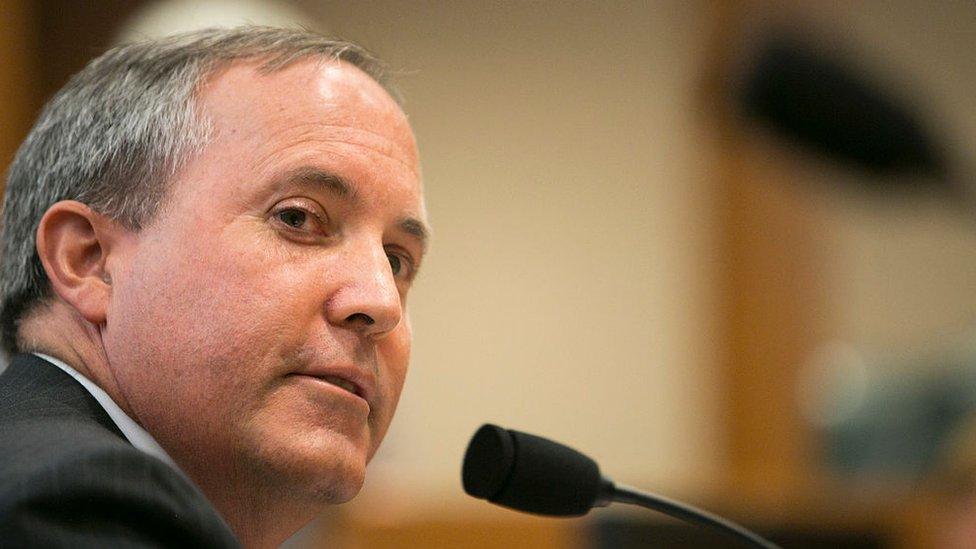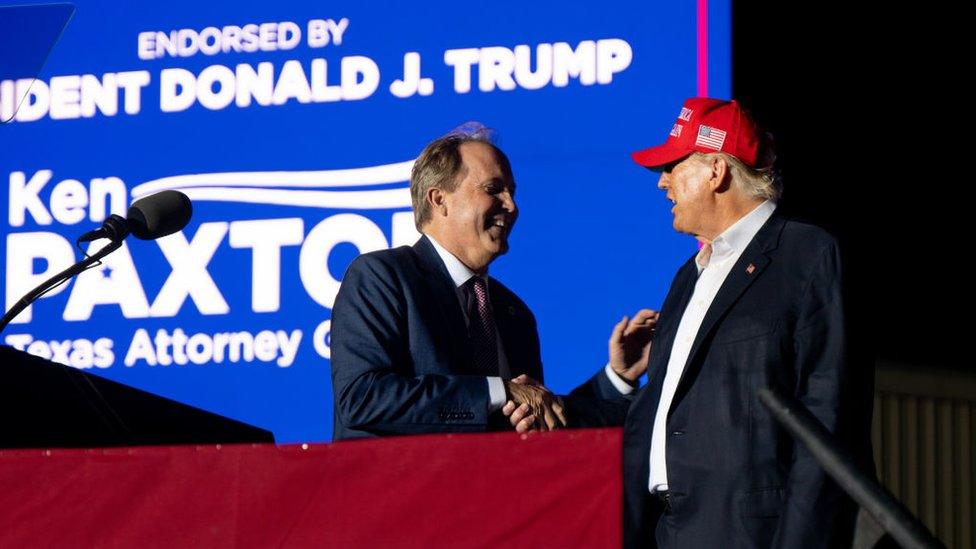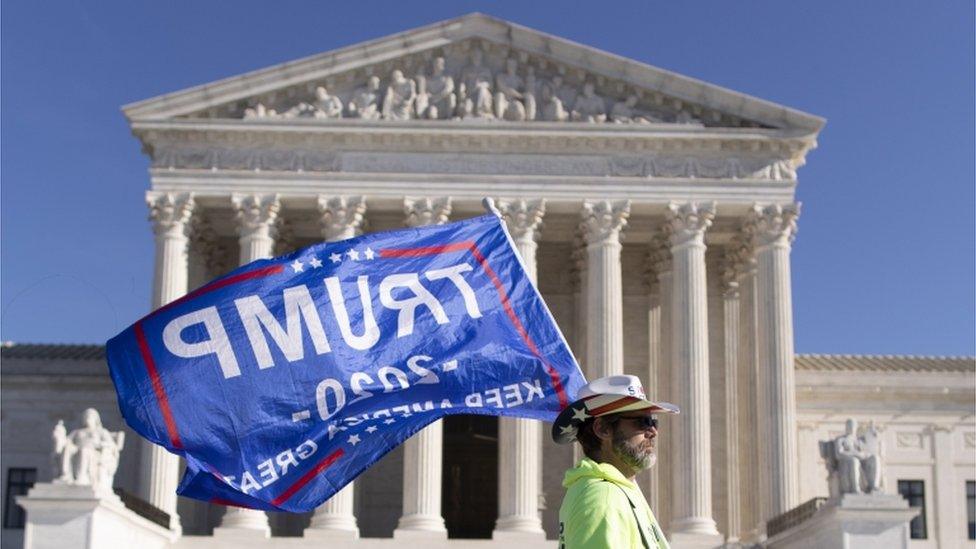Ken Paxton: Why Republicans are impeaching a Trump ally in Texas
- Published

The impeachment trial for Texas Attorney General Ken Paxton began on Tuesday, setting the stage for a political and legal drama that exposes deep divides within the Republican Party.
The fate of the state's top lawyer, an ally of former President Donald Trump, is in the hands of the Republican-controlled state Senate, which serves as a jury in the case. But it's far from clear how his fellow Republicans will cast their votes - and that has provoked fury at the national level too.
"We want the entire Maga movement to understand that what's going on in Texas is not just about Texas," said former Donald Trump adviser Steve Bannon, referencing the former president's "Make America Great Again" movement on a recent episode of his podcast.
In May, the Republican-controlled Texas House of Representatives voted 121 to 23 to impeach the state's top lawyer on 20 counts of corruption, obstruction of justice, bribery and abuse of public trust. The charges relate to favours he allegedly granted a Texas real estate developer, the use of public funds to punish whistleblowers on his staff and cover up their allegations, and benefits he directed to a woman with whom he was having an extramarital affair.
Mr Paxton has also been under federal investigation and state indictment for securities fraud since shortly after winning office eight years ago, although the four impeachment counts related to those charges are not currently being considered by the Senate.
The attorney general, who has been suspended from his official duties since his impeachment, has denied all wrongdoing. He has called the impeachment a "politically motivated sham".
Mr Paxton is one of Donald Trump's most ardent supporters in Texas, supporting the former president's unsuccessful attempts to challenge his 2020 presidential election defeat and championing some of his top issues. He has filed multiple lawsuits against the Biden administration, including recent challenges to its immigration and healthcare policies.
The attorney general's impeachment and trial in conservative Texas have fractured the state and national Republican Party on what have now become familiar lines.
On one side is the pro-Trump faction in the party, starting with the former president himself, who endorsed Mr Paxton when he ran for re-election against George P Bush - the son of former Florida Governor Jeb Bush.
They've characterised the impeachment push as an attempt to subvert the results of that election - rhetoric the former president has used to defend himself against his own impeachments and against the multiple indictments brought against him

Mr Paxton greets Donald Trump during a rally for the 2022 midterm elections
Shortly after the attorney general was impeached, Mr Trump posted "free Ken Paxton" on his social media site and called the effort "election interference" by "radical left Democrats", criminals and insufficiently loyal Republicans.
Matt Schlapp, the embattled head of the American Conservative Union and another Trump loyalist, called the Republicans opposing Mr Paxton "spineless" and wrote on social media that what they were doing was "appalling".
On the other side of the Paxton fight are the state's more traditional conservatives, including current speaker of the Texas House of Representatives Dade Phelan and former Governor Rick Perry.
"Republicans once believed in the rule of law," Mr Perry wrote in a Wall Street Journal essay last month. "That's why it's shocking to see some Republicans - through a coordinated effort of texts, emails and social media posts - working to delegitimise the impeachment proceedings against Attorney General Ken Paxton."
Texas State Representative Andrew Murr voted for impeachment and is one of the Republicans serving as a prosecutor during the Senate trial. On Tuesday he laid out the case against the attorney general.
"Mr Paxton has been entrusted with great power" he said. "Unfortunately, rather than rise to the occasion, he's revealed his true character, and as the overwhelming evidence will show, he's not fit to be the attorney general for the state of Texas."

The Texas Senate has not conducted an impeachment trial of an elected politician in 106 years
During the first day of trial, Mr Paxton's lawyers made multiple motions to dismiss some or all the charges against him. After the trial concludes, it will take at least 21 votes out of the 31-member chamber to convict and remove the attorney general. None of Mr Paxton's motions received more than 10 votes, however, suggesting that Mr Paxton will have to win over more support among the chamber to avoid removal and a possible ban from holding future state elected office.
Mr Paxton's wife, Angela, serves in the chamber but she will not be allowed to vote or otherwise participate in the trial. Her presence raises the number of votes necessary to reach the two-thirds mark from 20 to 21, however.
The Texas Senate has not conducted an impeachment trial of an elected politician in 106 years, but the process will follow traditional legal rules. Both the defence and the prosecution will make opening and closing remarks, and both sides can present evidence and call and cross-examine witnesses.
Mr Paxton probably will not be among them, however, as Texas Lieutenant Governor Dan Patrick - the Republican who is presiding over the trial - ruled on Tuesday that the attorney general cannot be compelled to testify.
His defence attorney has done plenty of talking, however, calling the charges against the attorney general "offensive", "flat-out false" and "untrue" as he was announcing his client's not guilty pleas on Tuesday morning.
It was enough to earn a rebuke from one of the prosecuting attorneys, who asked that his opponent stop the theatrics.
With more than 100 witnesses scheduled to testify, including some close Paxton associates who are now accusing him of wrongdoing, the political theatrics in Austin are probably just getting started.
Related topics
- Published28 May 2023

- Published9 October 2021

- Published12 December 2020
